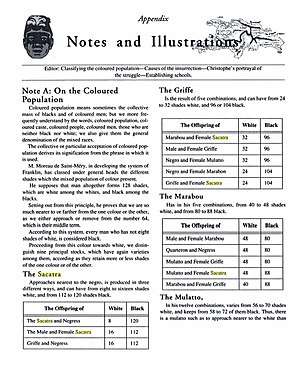Sacatra
Sacatra was a term used in the French Colony of Saint-Domingue to describe one who was the descendant of one black and one griffe parent.[1] The term is also used to describe one whose ancestry is 7⁄8ths black and 1⁄8th white. It was one of the many terms used in the colony's racial caste system to measure one's black blood.[2]

Document on Haitian racial classification
The etymology of sacatra is uncertain; Félix Rodríguez González linked it to the Spanish sacar ("take out") and atrás ("behind");[3][4] thus, a sacatra is a slave who is not kept in the house or at the front as a lighter-skinned servant might be.
In fiction
- In French author Suzanne Dracius' 1989 novel, The Dancing Other, she mentions her main character finding "true friendship with a cheery sacatra girl with soft, caramel skin." [5]
- Nalo Hopkinson's speculative fiction novel The Salt Roads begins with Georgine, a slave girl who gets pregnant by a white man, denying that her child is going to be "just mulatto. I’m griffonne, my mother was sacatra. The baby will be marabou.” [6]
gollark: I have about 500 lines of nginx configuration.
gollark: I used caddy for a bit until v2 broke everything and annoyed me.
gollark: On the plus side, it is a very good webserver apart from that.
gollark: It randomly does different things depending on `/` presence, `root` and `alias` are separate slightly confusing things for some reason, and the only code reuse mechanism is `include`.
gollark: Nginx's configuration manages to be impressively incomprehensible despite its relatively clean syntax.
See also
- Mulatto Haitians
- Quadroon
- Octoroon
- Affranchi
- Gens de couleur
- Afro-Haitians
- Marabou
References
- "Sacatra". Wordnik.
- "The Kingdom of This World". msu.edu. Retrieved 2017-03-28.
- Gonzáles, Félix Rodríguez (26 June 2017). "Spanish Loanwords in the English Language: A Tendency towards Hegemony Reversal". Walter de Gruyter GmbH & Co KG – via Google Books.
- Curry, Ginette (5 May 2009). ""Toubab La!" Literary Representations of Mixed-Race Characters in the African Diaspora". Cambridge Scholars Publishing – via Google Books.
- "Nancy Naomi Carlson and Catherine Maigret Kellogg translating Suzanne Dracius". Drunken Boat. Retrieved 2017-04-08.
- Hopkinson, Nalo (2004). The Salt Roads. New York: Warner US. p. 2. ISBN 978-0446677134.
This article is issued from Wikipedia. The text is licensed under Creative Commons - Attribution - Sharealike. Additional terms may apply for the media files.